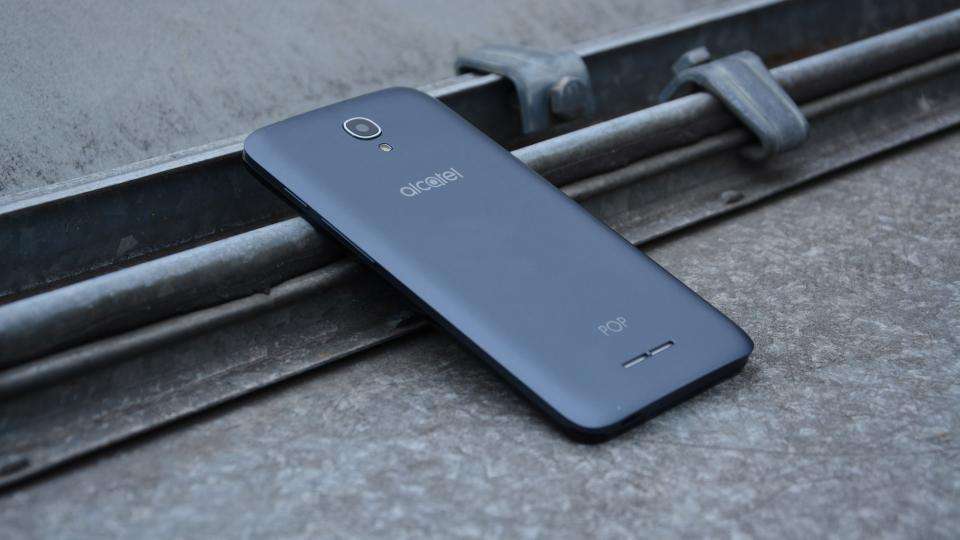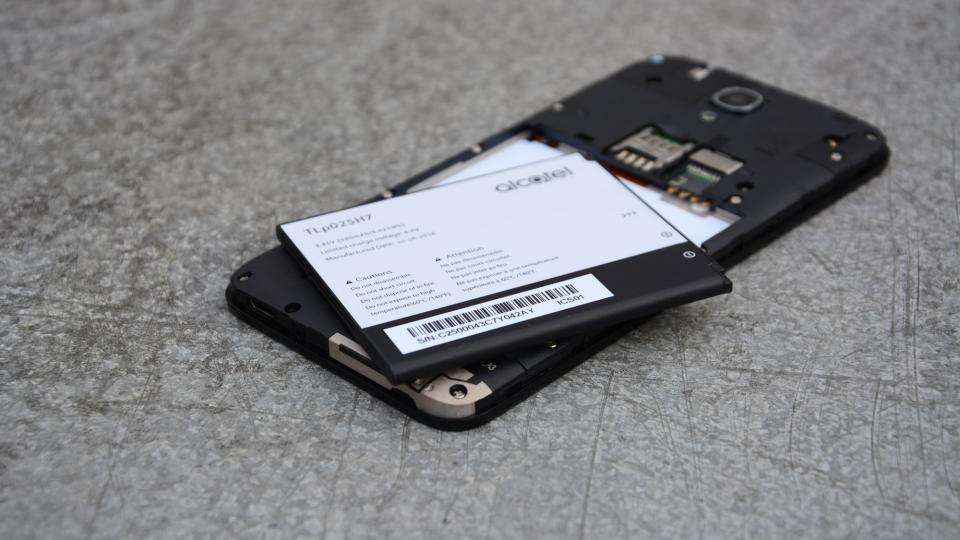I originally reviewed the Pop 4 at £70, and in 2017 it faced some stiff competition from the Vodafone Smart Prime 7 , and Alcatel’s very own Pixi 4 (5) , which could be found for £70 and £60, respectively. However, since, these phones are somewhat hard to find brand-new. The same could be said about the Pop 4, but there are still a few retailers that stock it new for £60 . There's also now the Vodafone Smart E8 to contend with, too.
My verdict hasn't changed since 2017 – it's still outclassed by its competitors. Here, I'd pick the slightly more expensive Vodafone Smart Prime 7 or the cheaper Smart E8, instead of the Pop 4.
If you're keen to know why – continue reading my original review below.
Cheap Android phones don’t always have to be awful. In fact, phones such as the Alcatel Pixi 4, the Vodafone Smart Prime 7 and the Alcatel Pop 4 I’m reviewing here, prove that you can get by these days with a phone costing a fraction the price of a flagship.
Where once upon a time sub-£100 smartphones were the watchword for small handsets with poor displays and terrible performance, those days seem consigned to the past. The Alcatel Pop 4, for instance, has a 5in HD (720 x 1,280) screen, a quad-core processor, a 256GB microSD card expansion slot and a removable battery, is 4G-enabled and comes with Android 6 Marshmallow. And yet it costs a mere £70.

READ NEXT: Best budget phones – our pick of the best .
Alcatel Pop 4 review: Build quality
No matter the improvement in quality of budget phones in recent times, there’s usually something that gives, and with the Pop 4 it’s build quality, which is a mixed bag. In the hand, I felt the phone wasn’t particularly comfortable to grip due to the slightly raised plastic lip that borders the front of the phone.

The phone is light, though, at a mere 134g, it’s pretty slim, measuring a mere 8mm from the glass at the front to the rear panel, and overall it’s a sleeker handset than the Alcatel Pixi 4 (5) .
Beneath the phone’s screen are three illuminated capacitive buttons, with the home button always remaining visible. I found the placement of its micro-USB port on the bottom-right-hand corner different from most smartphones on the market. You’ll find a volume rocker and power button on the right edge with a 3.5mm headphone jack at the top of the phone.

Around the back, the camera module protrudes a touch, which rather irritatingly means the phone rocks when used on a flat surface. On the positive side, you can remove the plastic rear cover, granting access to a removable 2,500mAh lithium-ion battery, microSD and micro-SIM slots.
READ NEXT: Alcatel Pixi 4 (5) review
Alcatel Pop 4 review: Display
Unlike the non-HD display of Pixi 4 (5) , the Pop 4 has an HD, 720 x 1,280 IPS screen. This gives it a pixel density of 294 pixels per inch (ppi) across its 5in diagonal, compared with the Pixi 4 (5)’s lowly 196ppi and it’s a difference you can see with the naked eye. Text in particular looks far sharper on the Pop 4’s display – a major step forwards.
The Pop 4’s screen is reasonably bright, too. I tested it at 414cd/m2, which means it’s good enough to be read comfortably in most outdoor conditions – aside from direct, bright sunlight – without having to shade it with your hand. Colour rendition isn’t quite so impressive, with 79.30% coverage of the sRGB colour gamut. In real-world use, this translates to a pretty good-looking screen, but one where the colours are a little dull and pale compared with the best smartphone screens in the business.
The contrast ratio is good, though. At maximum brightness it outputs a contrast ratio of 1,405:1 with an above-par 0.29cd/m2 black level. At this price, it’s an improvement over the Vodafone Smart Prime 7 ’s 1,060:1 contrast ratio and 0.45cd/m2 black level. And, due to having an IPS screen, viewing angles are excellent with no noticeable colour shift.
Alcatel Pop 4 review: Software
The Pop 4 comes with Android 6 Marshmallow out of the box. Even though it isn’t running Android 7 Nougat, I was pleased to see it come with a minimal number of preinstalled apps, ensuring a reasonably clean Android experience.
It does come with Alcatel’s OneTouch Launcher, however, which isn’t necessarily a bad thing. I’m a fan of its simplicity and ease of use – it gives the phone its own identity without riding roughshod over what makes Android great in the first place – and you can always change the launcher, by finding a free or paid one on the Play store .
Alcatel Pop 4 review: Performance
A Qualcomm Snapdragon 210 chipset is found within the Pop 4, which is the very same chip found within the Vodafone Smart Prime 7 . This budget phone isn’t aimed at gamers: its quad-core 1.1GHz Cortex-A7 processor, Adreno 304 GPU and 1GB of RAM provide a sluggish experience with advanced games.
In the Geekbench 4 benchmarks, the Pop 4’s single- and multi-core scores were disappointing, with respective scores of 315 and 762. In everyday use, I found performance equally poor, with a noticeable delay when switching between apps, jittery vertical scrolling in menus and web pages and slow, sluggish animations when returning to the phone’s homescreen.
Surprisingly, the Pop 4’s performance isn’t as good as the cheaper Alcatel Pixi 4 (5). That phone with its MediaTek processor felt much more responsive when I reviewed it and it had higher Geekbench 4 scores.
The Pop 4’s Adreno 304 GPU isn’t able to keep up with games either. An average frame rate of 3.8fps in the GFXBench Manhattan 3 onscreen benchmark indicates the Pop 4 will be able to play Candy Crush without too much trouble, but it will be unable to cope with graphically intense games, such as Asphalt 8: Airborne .
At this price point that’s not unusual; pretty much all sub-£100 phones perform like the Pop 4. And in any case, the phone’s limited storage, which stands at a miserly 8GB, will prevent you from installing anything too demanding.
As for battery life, that’s not much better. The Alcatel Pop 4 achieved 9hrs 32mins in our battery benchmark, which is an improvement over Pixi 4 (5)’s 8hrs 17mins but is still far behind the impressive 12hrs 55mins achieved by the Vodafone Smart Prime 7 . On the plus side, the Pop 4’s 2,500mAh battery can be removed, which allows you to carry around a spare or two for use in emergencies.
READ NEXT: Vodafone Smart Prime 7 review
Alcatel Pop 4 review: Camera
The one area in which the Pop 4 is distinctly better than the Alcatel Pixi 4 (5) is the camera. The Pop 4 comes with rear-facing 8-megapixel and front 5-megapixel cameras and the results are respectable for a £70 smartphone especially in HDR mode, which brings out the finer details in images.
^Road shot in Standard mode
^Road shot in HDR mode (better colour accuracy and more detail on the brickwork)
In my test shots, I found the Pop 4 held its own in outdoor shots. If you want the best image quality you’ll need to shoot in HDR, as in standard mode images looked washed out and overexposed with inaccurate colours. However, shooting in HDR does require a steady hand and, due to its sluggish performance, the Pop 4 does take a few additional seconds to process HDR images.
^Low-light indoor shot in Standard mode
^Low-light indoor shot in HDR mode (more detail and accurate colour reproduction)
I found its low-light performance poor, but this is to be expected with a phone at this price. Again, its HDR performance in low light brings out missing details and produces a much more pleasing image. I found its rear-facing flash added a blue hue to the image, making it look washed out, but its ability to light a very dark scene is useful.
^Picture taken in low light, on Standard mode with flash enabled
The front-facing 5-megapixel camera also has a flash, which is welcome, but it doesn’t add an awful lot of illumination or improve the quality of images in low light, which tend to look pretty smeary and muddy. The video quality isn’t great either, with the Pop 4 only able to capture moving images at 720p and 30fps.
Alcatel Pop 4 review: Verdict
The Alcatel Pop 4 is a good budget smartphone, then, but isn’t the one I’d pick, and that’s mainly due to the strength of its immediate rivals.
The phone’s internals are virtually identical to the Vodafone Smart Prime 7 , and its performance very similar, but for a little extra the Prime 7 grants you much better battery life and a sleeker design. On the other hand, the cheaper Alcatel Pixi 4 (5) feels more responsive.
If the Pop 4 could combine the fluidity of the Pixi 4 (5) with the sleek design and battery life of the Smart Prime 7, then it would be a brilliant budget smartphone. As it is, however, it’s a mediocre also-ran.
|
Hardware |
|
Processor |
Quad-core 1.1 GHz Cortex-A7 |
|
RAM |
1GB |
|
Screen size |
5in |
|
Screen resolution |
720 x 1280 |
|
Screen type |
IPS |
|
Front camera |
5 megapixels |
|
Rear camera |
8 megapixels |
|
Flash |
LED |
|
GPS |
Yes |
|
Compass |
Yes |
|
Storage |
8GB |
|
Memory card slot (supplied) |
microSD (256GB) |
|
Wi-Fi |
802.11 b/g/n |
|
Bluetooth |
Bluetooth 4.0 |
|
NFC |
N/A |
|
Wireless data |
3G, 4G |
|
Dimensions |
140.7 x 71.4 x 8 mm |
|
Weight |
134g |
|
Features |
|
Operating system |
Android 6.0 |
|
Battery size |
2,500mAh |
